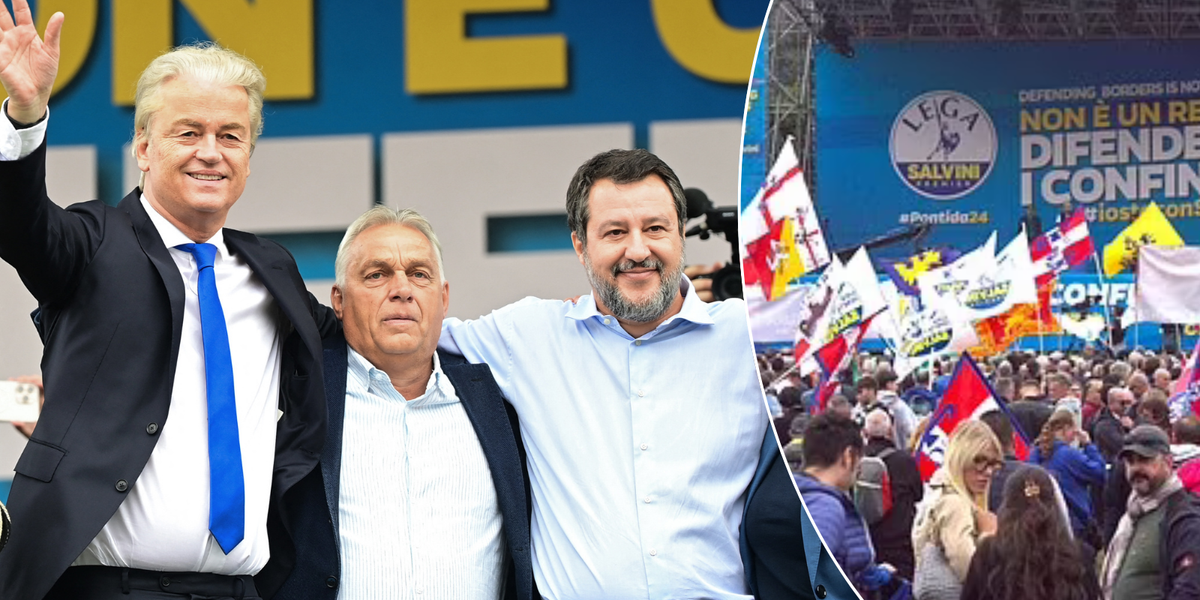The Anti-Migrant Glastonbury: A Right-Wing Rally in Northern Italy
Over the weekend, northern Italy became the epicenter of a significant right-wing rally, drawing thousands of anti-immigration protesters to Pontida, a picturesque town nestled at the southern edge of the Alps. Dubbed the "anti-migrant Glastonbury," this event showcased a coalition of Europe’s hard-right leaders, including Dutch Freedom Party chief Geert Wilders, Hungarian Prime Minister Viktor Orban, and Italy’s own Deputy Prime Minister Matteo Salvini. The rally served as a platform for these leaders to voice their concerns over illegal migration and to rally support for their nationalist agendas.
A Gathering of Hardliners
The rally was marked by the presence of prominent figures from across Europe’s far-right political landscape. Geert Wilders, who recently celebrated a historic government formation in the Netherlands, emphasized the urgency of addressing what he described as a "tsunami of mass illegal migration." His rhetoric resonated with the crowd, as he painted a picture of a Europe where native citizens feel increasingly alienated in their own countries.
Viktor Orban, a stalwart of anti-immigration sentiment in Hungary, echoed these sentiments, vowing to "never hand our countries over to foreigners." His remarks were met with enthusiasm from the audience, reflecting a shared commitment among the attendees to resist what they perceive as an encroachment on their national identities.
Salvini’s Resurgence
Matteo Salvini, the leader of Italy’s Lega party, has experienced a resurgence in popularity following a tumultuous period marked by a significant drop in support during the 2022 elections. His recent legal troubles, stemming from his decision to prevent a ship carrying over 100 migrants from docking in Lampedusa, have only fueled his narrative of martyrdom. Addressing the crowd, Salvini declared, "I would go to jail with my head held high," framing his legal challenges as a struggle for the Italian people against a system that he claims seeks to undermine their sovereignty.
The rally provided Salvini with a platform to reclaim his status as a leading figure in the right-wing movement, with both Orban and Wilders praising his efforts. Wilders even went so far as to express his admiration, stating, "I love you," to Salvini, highlighting the camaraderie among these nationalist leaders.
A Mixed Response from the League
While the rally was a clear victory for Salvini and his supporters, not all members of the Lega party were entirely on board with the nationalist rhetoric. Historically, the Lega has focused on regional autonomy, particularly for Italy’s wealthier northern regions. Some party activists expressed skepticism about the shift towards a more nationalistic agenda, fearing it could overshadow their regional identity.
Matteo Rigamonti, a former mayor from the region, articulated this concern, stating, "Our battle cry is regional autonomy, and many League members are suspicious of this talk of nationalism." This internal division highlights the complexities within the party as it navigates its identity in a rapidly changing political landscape.
The Youth Perspective
Interestingly, the younger attendees at the rally seemed to prioritize immigration concerns over regional autonomy. Fifteen-year-old Luigi voiced a sentiment echoed by many of his peers, asserting, "We must defend our borders." This generational divide underscores a broader trend in which younger voters are increasingly aligning with nationalist sentiments, driven by fears of cultural dilution and economic competition.
Conclusion: A Reflection of Europe’s Rightward Shift
The Pontida rally is emblematic of a broader rightward shift occurring across Europe, where anti-immigration sentiment is gaining traction among voters disillusioned with traditional political parties. As leaders like Salvini, Orban, and Wilders unite under a common cause, the implications for European politics could be profound. The event not only showcased the strength of the far-right coalition but also highlighted the challenges and divisions within their ranks, particularly regarding regional versus national identity.
As Europe grapples with the complexities of migration and national identity, the voices from Pontida will likely continue to resonate, shaping the political discourse in the months and years to come. The rally may have been a moment of triumph for its leaders, but it also serves as a reminder of the ongoing tensions that define contemporary European politics.
